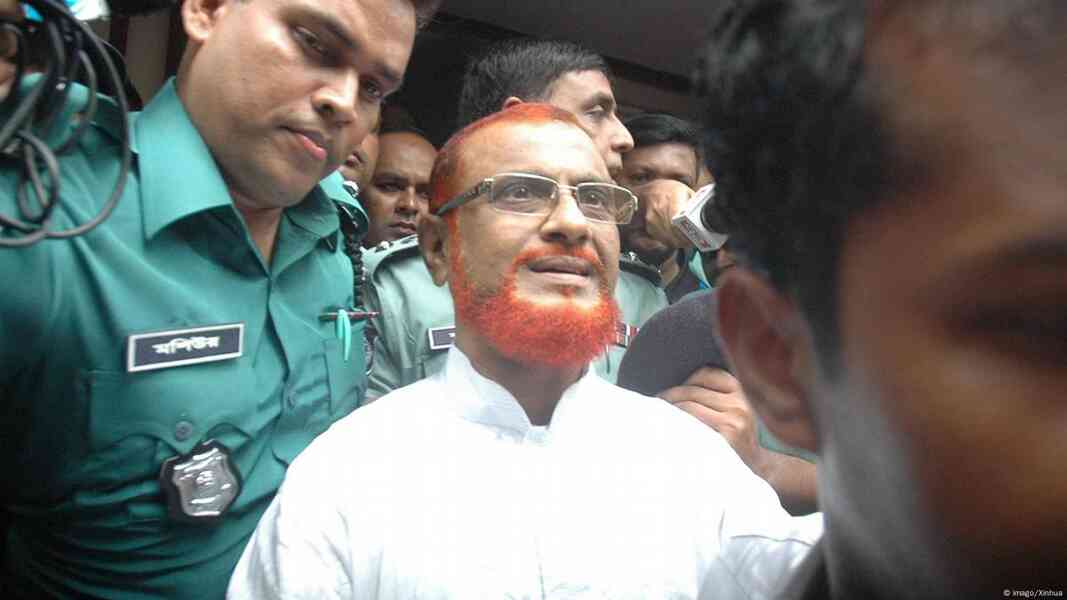Bangladesh’s War Criminal Scandal Unraveled
A nation’s justice system faces scrutiny as a convicted war criminal walks free, reigniting painful memories of 1971

Behind the Veil
In a shocking turn that has ripped open old wounds, Bangladesh’s Supreme Court acquitted Jamaat-e-Islami leader ATM Azharul Islam on May 27, 2025, overturning his 2014 death sentence for heinous crimes committed during the 1971 Liberation War. The decision, delivered by a seven-member bench led by Chief Justice Syed Refaat Ahmed, has ignited a firestorm of outrage, with critics like the Awami League calling it a “national disgrace” and a betrayal of the martyrs who fought for Bangladesh’s independence. This acquittal, under an interim government led by Nobel laureate Muhammad Yunus, raises chilling questions: Is justice being undone? Are war criminals being shielded by a regime lacking constitutional legitimacy? The stakes are monumental, as Bangladesh grapples with its blood-soaked past and a fragile present.
The Figure’s Light
ATM Azharul Islam, now 73, is no ordinary figure. A senior leader of Jamaat-e-Islami, Bangladesh’s largest Islamist party, he rose through the ranks as a key figure in the party’s student wing, Islami Chhatra Sangha, during the 1971 war. Born in 1952, Azharul’s early life was marked by his allegiance to pro-Pakistan ideologies, opposing Bangladesh’s independence. By 2012, when he was arrested, he had become the assistant secretary general of Jamaat-e-Islami, a polarizing political force. His supporters viewed him as a steadfast advocate for Islamic values, while detractors saw him as a collaborator in one of history’s darkest genocides. Azharul’s notoriety stems not from public charisma but from his alleged role as a commander of the Al-Badr militia, a pro-Pakistan force accused of aiding the Pakistani army in mass atrocities. His 2014 conviction cemented his infamy, yet his acquittal has thrust him back into the spotlight, a symbol of unresolved trauma.
The Shadow Falls
The 1971 Liberation War was a brutal chapter in Bangladesh’s history, where an estimated 300,000 to 3 million Bengalis were killed, and 200,000 to 400,000 women were raped by the Pakistani army and its local collaborators, including the Al-Badr militia. Azharul was accused of orchestrating atrocities in Rangpur, northern Bangladesh, as a top Al-Badr commander. The charge sheet, filed by the International Crimes Tribunal (ICT) in 2012, detailed his role in the murder of 1,256 people, abduction of 17, rape of 13 women, torture, and arson that destroyed hundreds of homes. On December 30, 2014, ICT-1 sentenced him to death on five of nine charges, a verdict upheld by the Supreme Court in October 2019.
Azharul appealed in January 2015, claiming innocence, but the Appellate Division, led by then-Chief Justice Syed Mahmud, rejected it. A review petition filed in 2020 was accepted, and on February 26, 2025, the court granted leave to appeal, culminating in the May 27 acquittal. The court’s rationale? The death sentence was based on an “unjust verdict” due to improper evidence assessment. Azharul was ordered released immediately if no other cases were pending. This ruling, the first of its kind by the Appellate Division in a crimes-against-humanity case, stunned observers, as five other convicted war criminals—four from Jamaat-e-Islami and one from the Bangladesh Nationalist Party—had already been executed.
The interim government, led by Muhammad Yunus since August 2024, has faced accusations of enabling this outcome. Last year, it lifted the ban on Jamaat-e-Islami and its student wing, Islami Chhatra Shibir, a move critics link to the acquittal. The decision has fueled claims that the government, lacking a constitutional mandate after ousting Sheikh Hasina’s elected regime, is rewriting history to favor anti-liberation forces.

Murmurs in the Dark
The public reaction has been visceral. On May 27, 2025, left-leaning students at Dhaka University and Rajshahi University took to the streets, decrying the acquittal as a betrayal. Shimul Kumbhakar, general secretary of the Bangladesh Students’ Union, told a rally, “This government has betrayed the people. We are seeing the release of a war criminal.” Jabir Ahmed Jubel of Revolutionary Student Unity added, “The man whose hands are stained with blood walks free.” The Awami League, now banned and operating underground, issued a scathing statement on X: “This ruling is a slap in the face to every mother who lost her child, every woman who was violated, and every freedom fighter.”
On X, sentiments are polarized. User @NMukherjee6 posted, “B’DESH GOVT CLEARS WAR CRIMINALS, REVIVES EXTREMISTS,” reflecting widespread outrage. Conversely, @SakibulHoque_ called the verdict “historical,” celebrating Azharul’s release as justice for an “unjustly imprisoned” leader. Jamaat-e-Islami supporters, like party leader Shafiqur Rahman, hailed the decision, with Rahman offering a vague apology: “We seek your pardon, if we have done anything wrong.” The interim government’s Law Adviser, Asif Nazrul, praised the acquittal as a triumph of the 2024 student-led movement that ousted Hasina, further inflaming critics.
Historical commentary underscores the divide. The 1971 war saw pro-Pakistan Bengalis, including Jamaat leaders, collaborate with the Pakistani army, a fact documented by scholars like Sarmila Bose. The Awami League’s Shahbag Revolution in 2013 demanded justice for war crimes, a movement now seemingly undone.
The Cost Now
The immediate fallout is seismic. Azharul’s release has shattered trust in Bangladesh’s judiciary, with the Awami League accusing the Yunus regime of judicial interference to rehabilitate Jamaat-e-Islami. The decision risks emboldening anti-liberation forces, as Jamaat, once banned for its pro-Pakistan stance, regains political footing. The interim government’s legitimacy, already questioned after Hasina’s ouster on August 5, 2024, faces further erosion. Over 1,400 deaths during the 2024 protests, coupled with Hasina’s exile in India, have left Bangladesh politically volatile.
For survivors of 1971, the acquittal is a gut punch. Families of victims, who waited decades for justice through the ICT, now see a convicted perpetrator walk free. The ruling also strains Bangladesh-India relations, as India supported the liberation war and hosts Hasina. Posts on X warn of rising tensions, with @hindupost noting the victims were “mostly Hindus,” highlighting communal sensitivities.
Unveiled Futures
What lies ahead? The acquittal could set a precedent for revisiting other war crimes cases, potentially freeing more convicted collaborators. With no higher court to appeal the decision, as noted by state counsel, justice for 1971 seems stalled. The interim government faces pressure to hold elections by late 2025, but Azharul’s release may galvanize protests, as student groups vow broader movements.
Unresolved questions linger: Was evidence mishandled in 2014, or is the judiciary bending to political pressure? Why has the Yunus administration, led by a Nobel laureate, aligned with Jamaat’s interests? Experts suggest the interim government’s need for political allies, including Islamists, may explain the shift. The cultural impact is profound—Bangladesh’s secular identity, forged in 1971, faces erosion as pro-Pakistan narratives resurface. The lack of international tribunals for 1971, due to Cold War politics, means domestic courts remain the only recourse, now under scrutiny.
Final Revelation
ATM Azharul Islam’s acquittal is more than a legal twist; it’s a wound to Bangladesh’s soul, reopening the scars of 1971. As the nation grapples with a contested past and an uncertain future, one question burns: Will justice for the Liberation War’s victims ever be fully served? Stay sharp with Ongoing Now 24. /





